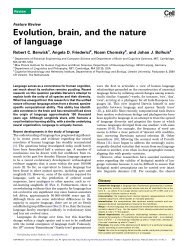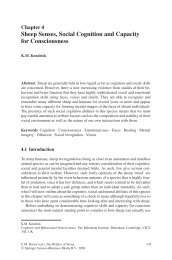Ulric Neisser
Ulric Neisser
Ulric Neisser
You also want an ePaper? Increase the reach of your titles
YUMPU automatically turns print PDFs into web optimized ePapers that Google loves.
they accepted me into the graduate program. I was happy to be a Harvard student again, but felt<br />
that I had lost a lot of time in the intervening four years. To make up for lost time I moved<br />
quickly, taking qualifying exams in my first year and completing a dissertation by the end of the<br />
second. My choice of topic was not governed by any theoretical commitment - Gestalt<br />
psychology and information theory had both lost their allure by this time - but by how quickly I<br />
could do the required research. That criterion led me to a rather obscure topic: S. S. Stevens'<br />
"neural quantum" hypothesis of the auditory threshold. I did not have much rapport with Stevens<br />
himself, but his hypothesis made clear predictions and the necessary apparatus was already in<br />
place. I ran subjects, analyzed data, identified certain artifacts in the "quantal method" (cf.<br />
<strong>Neisser</strong>, 1957) and got my degree.<br />
By that time, oddly enough, I had begun to think that I was leaving Harvard too soon.<br />
Surely it had more to offer than I had learned in two hasty years! So I arranged to stay a third<br />
year after all, supported by a Harvard instructorship (teaching "Sensation and Perception") and<br />
an NIH fellowship. To get the fellowship I proposed a new technique for the measurement of<br />
pain thresholds - still another obscure topic in which I was again not really interested. (The pain<br />
itself, created by focusing a beam of light onto the back of the subject's hand, was not severe.) In<br />
the upshot I did conduct the research but didn't like it much. A complex apparatus had to be built<br />
and calibrated, and I was beginning to realize that I am not good with apparatus. Other people at<br />
Harvard were much better: George Sperling (1960), for example, was doing elegant<br />
tachistoscopic studies of what he then called the "visual image." Later, in Cognitive Psychology,<br />
I would call it "iconic memory."<br />
Pattern recognition<br />
It was time to move on, and an opportunity soon presented itself. Richard Held, with<br />
whom I had been acquainted since my Harvard undergraduate days, was now teaching at<br />
Brandeis and suggested that I apply for a job there. I don't remember my job talk now, but it<br />
must have been OK: I was appointed assistant professor at $4000/year. By this time Anna and I<br />
had four children (Mark, b.1954, Julie, b.1956, Phil, b.1957, Toby, b.1958), so we certainly<br />
needed the money. We lived for a while in Boston and then built a house in Lincoln Mass.; I<br />
commuted to Brandeis (in Waltham) on a motor scooter. We spent most of our summers in<br />
Maine, courtesy of my artist father-in-law Waldo Peirce. It was a strenuous domestic life, and<br />
unfortunately one in which Anna and I were increasingly at odds.<br />
Intellectually, my 7 1/2 years at Brandeis were years of development. The psychology<br />
department itself was best known for the humanistic psychology of its Chairman, A.H. Maslow. I<br />
liked Maslow's idealism, which reminded me of Gestalt psychology. I also resonated to his<br />
insistence that psychology needed a "third force," i.e., a theoretical approach that was neither<br />
behaviorism nor psychoanalysis. (He hoped that the third force would be humanistic/existential<br />
psychology, but it turned out to be cognitive psychology instead.) Harvard was not far away, and<br />
I often attended talks at the recently established "Center for Cognitive Studies" there. All this<br />
was intriguing, but the theorist who influenced me most was neither at Brandeis nor Harvard and<br />
not even a psychologist: Oliver Selfridge of the M.I.T. Lincoln Laboratory. Introduced by a<br />
mutual friend, Oliver and I soon found many interests in common. At his suggestion I soon<br />
began to spend Thursdays at his Lab as a consultant, an arrangement that benefited me<br />
financially as well as intellectually. Oliver had no advanced degree; nowadays he would be<br />
called a "cognitive scientist, but no such category existed then. He was working on machine<br />
pattern recognition, especially of patterns such as hand-written letters or Morse code. He<br />
7




